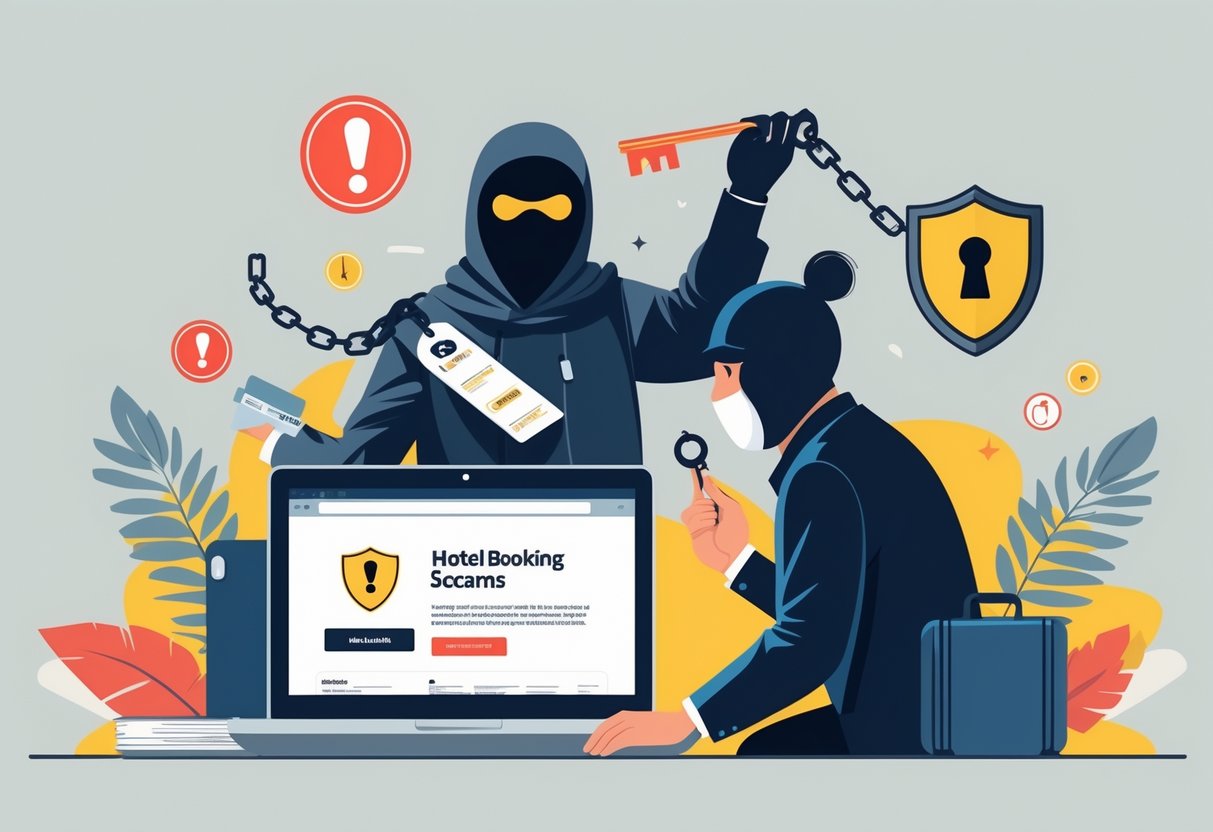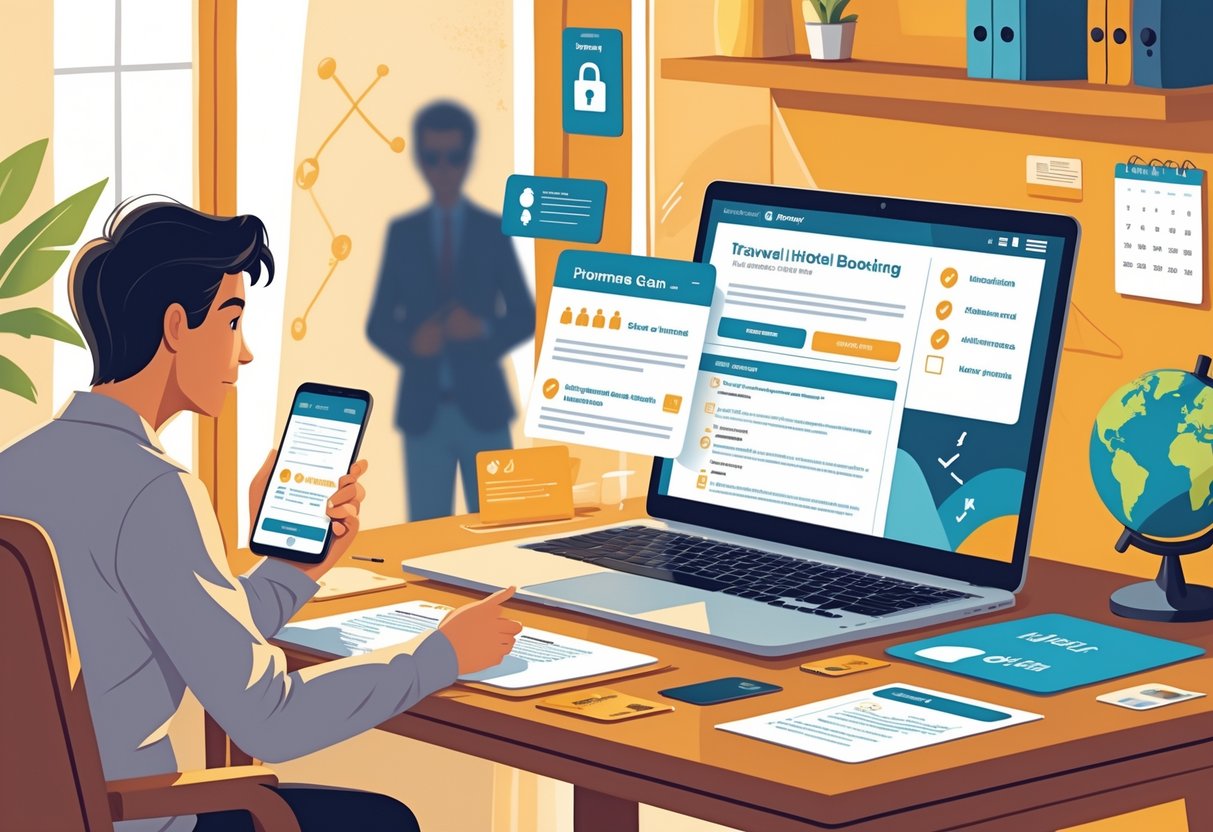
Every year, many travelers fall victim to hotel booking scams, risking both their hard-earned money and their peace of mind. Travelers can protect themselves from falling for hotel booking scams by identifying key warning signs before making a reservation.
Scammers lure people in with fake booking websites, emails posing as legitimate hotels, and deals that seem too good to be true, putting both personal data and travel budgets at risk.
Recognizing signs of fraud, such as requests for upfront payment through unusual methods, suspicious-looking booking sites, and unsolicited emails asking to confirm payment information, is essential for anyone planning a trip. Travelers should always verify the hotel’s official site and carefully review the legitimacy of booking platforms to safeguard their travel investment.
For more details on red flags and how to avoid travel and hotel room booking scams, being informed is the most effective defense.
Understanding Hotel Booking Scams
Hotel booking scams continue to be a risk for travelers, especially with the rise of online travel planning and digital payment. Knowing how these scams operate is essential to keep personal data and financial details protected during the booking process.
What Are Hotel Booking Scams?
Hotel booking scams involve fraudulent tactics that trick people into paying for hotel reservations or services that do not exist or are misrepresented. These scams are found across popular travel websites, fake hotel booking portals, phishing emails, and even fraudulent phone calls.
Scammers often target individuals seeking last-minute deals, promising exclusive rates or limited-time offers to lure them in. Victims may pay upfront for rooms that are unavailable upon arrival, or they may disclose credit card information on a cloned website, resulting in financial loss.
These scams can also involve loyalty program theft, where criminals access or manipulate accounts to steal points or personal data. For example, some criminals run hotel scams by stealing loyalty points to book free rooms.
Travelers can be left without accommodation, lose their travel investment, or become targets of identity theft.
Common Scam Tactics
Scammers use a variety of deceptive methods to exploit unsuspecting travelers. One method is creating fake hotel booking websites that mimic real ones, making it challenging for users to distinguish legitimate platforms from fraudulent ones.
Some websites may have subtle differences, like missing security certificates or slightly altered URLs. Another tactic involves phishing emails that mimic legitimate hotel communications, asking for urgent confirmation of credit card details or reservation updates.
These emails may include links to fake pages designed to harvest personal data. Travelers may also encounter phone scams, where a caller impersonates hotel staff and asks for payment details to “confirm” a reservation.
Demanding large upfront fees for reservations or encouraging wire transfers are also classic red flags, as legitimate hotels rarely require full prepayment without providing verifiable proof of booking. Scammers can even advertise fake hotel listings on reputable platforms, tricking users into paying for non-existent properties.
For more warning signs and red flags of vacation scams, travelers should be cautious about offers that seem too good to be true or require unusual payment methods.
Warning Signs of Hotel Booking Scams

Hotel booking scams often use misleading tactics and subtle warning signs that can trick even experienced travelers. Recognizing these danger signals early helps protect personal and financial information during the booking process.
Red Flags to Watch For
Scam hotel booking sites can hide behind well-designed pages or familiar brand names, so it’s important to look beneath the surface. Misspellings in web addresses, poor grammar, and low-resolution logos can indicate a phony website.
Unexpected requests for sensitive information, such as passport numbers or copies of IDs before check-in, are a major red flag. Booking confirmation emails that lack details like the property’s direct contact information or include suspicious links should be approached with caution.
Travelers should always check that booking portals use secure payment systems. Look for “https” in the URL and a padlock icon before making payments.
Experts agree that only booking through official hotel sites or trusted travel agencies is safer than relying on unfamiliar third-party platforms.
High-Pressure Tactics
Many hotel booking scams employ high-pressure tactics to rush travelers into making quick decisions. Countdown timers, claims that “only one room is left,” or pop-up notifications about others currently viewing the same room are designed to increase urgency.
Emails or calls demanding immediate payment to “secure” a reservation are a sign to pause and verify. Reputable hotels rarely require immediate action, especially through unconventional payment methods like wire transfers or gift cards.
Pressure tactics are especially common during peak travel seasons such as summer, when demand is high and scammers know travelers are anxious to secure last-minute deals. Always take a moment to double-check before entering payment details.
Too-Good-to-Be-True Offers
Unusually cheap rates or luxury accommodations far below average market prices can be a tactic to lure travelers into a scam. Listings that include complimentary VIP upgrades, free flights, or access to exclusive events like the NFL Super Bowl at a fraction of the real cost are likely fraudulent.
Be wary of upfront fees that are required before receiving booking confirmation. Legitimate providers often include taxes and fees in the advertised price and do not ask for surprise add-ons after checkout.
Scammers might request payment for special “free” offers, then disappear once the money is sent. Reading reviews on independent websites and confirming booking details by calling the property directly will help weed out fake listings and protect against vacation scams.
Always ask for written confirmation and clear cancellation policies before completing a booking.



